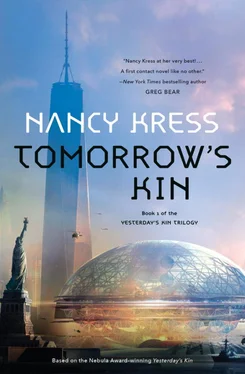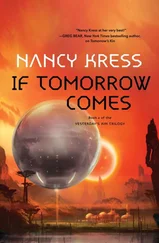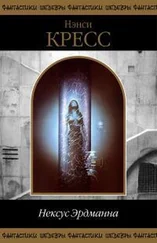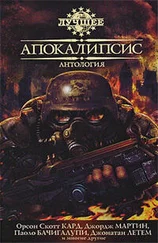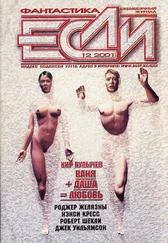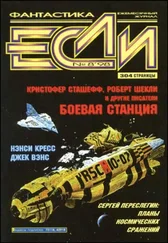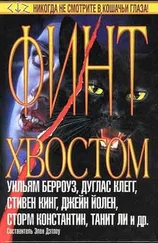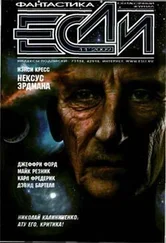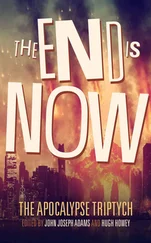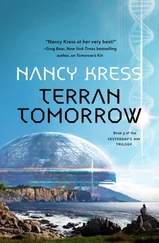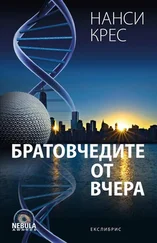At the bottom of the page, someone—presumably Ryan—had hand-drawn in purple ink three stylized versions of a loosestrife spike, then circled one. To Marianne it looked like a violet rocket ship unaccountably sprouting leaves.
Downstairs, Jason had been cleaned up and changed. Marianne played with him the limited games available for two-month-old babies: peekaboo, feetsies go up and down, where did the finger go? When he started to fuss and Connie excused herself to nurse him, Marianne said her good-byes and went out to the helicopter waiting in a nearby field. Neighbors had gathered around it, and Ryan was telling them… what? The neighbors looked harmless, but how could you tell? Always, Gina was on her mind. She hugged Ryan fiercely.
As the copter lifted and the house, the town, the countryside got smaller and smaller, Marianne tried not to think of what a failure the visit had been. Yes, she had seen her grandchild. But whatever comfort or connection that had been supposed to bring her, it hadn’t. It seemed to her, perhaps irrationally, that never had she felt so alone.
* * *
When Noah woke, he instantly remembered what day it was. For a long moment, he lay still, savoring the knowledge like rich chocolate on the tongue. Then he said good-bye to his room. He would never sleep here, out of his energy suit, again.
Over the months, he had made the room as World as he could. A sleeping mat, thin but with as much give as a mattress, rolled itself tightly as soon as he sprang up and into the tiny shower. On the support wall he had hung one of Oliver’s pictures—not a half-dressed barbarian princess this time, but a black-and-white drawing of plants in the World garden. The other walls, which seemed thin as rice paper but somehow kept out sound, had been programmed, at Noah’s request, with the subtly shifting colors that the Worlders favored for everything except family gatherings. Color was extremely important to Worlders, and so to Noah. He was learning to discern shades that had once seemed all the same. This blue for mourning; this blue for adventure; this blue for loyalty. He had discarded all his Terran clothes. How had he ever stood the yellow polo shirt, the red hoodie? Wrong, wrong.
Drying his body, he rehearsed his request to Mee^hao¡. He wanted to get the words exactly right.
Breakfast, like all World meals, was communal, a time to affirm ties. Noah had already eaten in his room; the energy suit did not permit the intake of food. Nonetheless, he took his place in the hierarchy at the long table, above Oliver and Jacqui and below everyone else. That was just. Family solidarity rested on three supports: inclusion, rank, and empathy. A triangle was the strongest of all geometrical figures.
“G’morning,” Oliver said, yawning. He was not a morning person, and resented getting up for a breakfast he would not eat until much later.
“I greet you,” Noah said in World. Oliver blinked.
Jacqui, quicker, said, “Oh, today is the day, is it? Can I be there?”
“At the ceremony? No, of course not!” Noah said. She should have known better than to even make the request.
“Just asking,” Jacqui said. “Doesn’t hurt to ask.”
Yes, it does. It showed a lack of respect for all three supports in the triangle. Although Noah had not expected any more of Jacqui.
He did expect more of the three Terrans who took their places below Oliver. Isabelle Rhinehart, her younger sister Kayla, and Kayla’s son had come into the World section of the Embassy only a week ago, but already the two women were trying to speak World. The child, Austin, was only three—young enough to grow up trilling and clicking World like a native. Noah gazed with envy at the little boy, who smiled shyly and then crawled onto his mother’s lap.
But they could not hold Noah’s interest long. This was the day!
His stomach growled. He’d been too excited to eat much of the food delivered earlier to his room. And truthfully, the vegetarian World diet was not exciting. But he would learn to like it. And what a small price to pay for… everything .
The ceremony took place in the same room, right after breakfast. The other Terrans had left. Mee^hao¡ changed the wall program. Now instead of subtly shifting greens, the thin room dividers pulsed with the blue of loyalty alternating with the color of the clan of Mee^hao¡.
Noah knelt in the middle of the circle of Worlders, facing Mee^hao¡, who held a long blue rod. Now I dub thee Sir Noah…. Noah hated, completely hated, that his mind threw up that stupid thought. This was nothing like a feudal knighting. It was more like a baptism, washing him clean of his old self.
Mee^hao¡ sang a verse of what he had been told was the family inclusion song, with everyone else echoing the chorus. Noah didn’t catch all the trilling and clicking words, but he didn’t have to. Tears pricked his eyes. It seemed to him that he had never wanted anything this much in life, had never really wanted anything at all.
“Stand, brother mine,” Mee^hao¡ said.
Noah stood. Mee^hao¡ did something with the rod, and the energy shield dissolved around Noah.
Not only a baptism—an operation.
The first breath of World air almost made him vomit. No, the queasiness was excitement, not the air. It tasted strange, and with the second panicky breath he felt he wasn’t getting enough of it. But he knew that was just the lower oxygen content. The Embassy was at sea level; the O 2concentration of World matched that at twelve thousand feet. His lungs would adapt. His marrow would produce more red corpuscles. The Worlders had evolved for this; Noah would evolve, too.
The air smelled strange.
His legs buckled slightly, but before Llaa^moh¡, whom he had once known as Jones, could step toward him, Noah braced himself and smiled. He was all right. He was here. He was—
“Brother mine,” went around the circle, and then the formalities were over and they all hugged him, and for the first time in 150,000 years, Terran skin touched the skin of humans from the stars.
S minus 3.5 months
The security officer met Marianne and Evan in their lab and conducted them to a euchre game in the observation area outside the BSL4 lab.
From the first time she’d come here, Marianne had been appalled by the amateurishness of the entire setup. Granted, this was a bunch of scientists, not the CIA. Still, the Denebs had to wonder why euchre—or backgammon or chess or Monopoly, it varied—was being played here instead of at one of the comfortable common rooms or cafeterias. Why two scientists were constantly at work in the negative-pressure lab even when they seemed to have nothing to do. Why the euchre players paid more attention to the screens monitoring the scientists’ vitals than to the card game.
Dr. Julia Namechek and Dr. Trevor Lloyd. Both young, strong, and self-infected with spore disease. They moved around the BSL4 lab in full space suits, breathing tubes attached to the air supply in the ceiling. Surely the Denebs’ energy suits would be better for this kind of work, but the suits had not been offered to the Terrans.
“When?” Marianne murmured, playing the nine of clubs.
“Three days ago,” said a physician whose name Marianne had not caught.
Spore disease (the name deliberately unimaginative, noninflammatory) had turned up in mice after three days. Marianne was not a physician, but she could read a vitals screen. Neither Namechek nor Lloyd, busily working in their space suits behind glass, showed the slightest signs of infection. This was, in fact, the third time that the two had tried to infect themselves by breathing in the spores. Each occasion had been preceded by weeks of preparation. Those times, nothing had happened, either, and no one knew why. There were theories, but nothing proved.
Читать дальше
